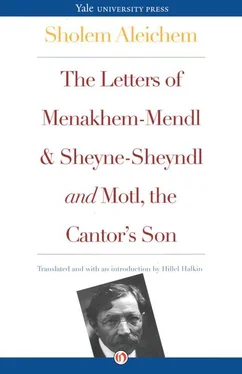He’s a worse pest than my brother Elye. Elye is pure gold next to him. He gets on our nerves so badly that we’ve thrown his dehpahzit back at him. But he doesn’t want to take it. He’s fallen in love with our stend. He’s sure we’re making a mint from it.
“A grinhawn is always a grinhawn!”
That’s Pinye’s opinion.
What exactly is a grinhawn? I wish you’d asked me something easier.
My friend Meik doesn’t know either. It’s a word everyone uses, so we do too. Just for fun I took some chalk and drew a picture on the sidewalk of the Jew who’s buying our stand. I put a big green horn on his forehead. You should have heard everyone laugh! They all recognized our grinhawn.
The only person not to laugh was Elye. He didn’t whack me. He just made me wet a rag and erase the grinhawn. Otherwise we’d have to pay a fine.
You pay fines here for everything. Try spitting in the strit and a pleesmin comes along and hauls you off to the steyshn. They make you pay five dahlehz there. It’s a real strict place, America.
I suppose you think that because of that no one spits in the strit and New York is as clean as Antwerp. You’re wrong. People spit and hawk up phlegm like all get-out. America is a free country. Maybe it’s different on Fif Tevenyoo. I don’t mean all of it. I mean the strits where the rich people live. A man spits when he’s feeling bad. The rich have it good, so why spit?
See, for instance, Dan Miron, “Bouncing Back: Destruction and Recovery in Sholem-Aleykhem’s ‘Motl Peyse dem khazns,’” Yivo Annual of Jewish Social Science 17 (1978), p. 180.
Marie Waife-Goldberg, My Father, Sholom Aleichem (London, 1968), p. 31.
From the Fair: The Autobiography of Sholem Aleichem, translated by Curt Leviant (New York, 1985), chapter 45.
Menakhem-Mendl, “Tsu der tsveyter oyflage,” volume 10 of the Folksfond Edition (New York, 1917–1925), pp. i — ii.
Max Erik, “Menakhem-Mendl: A Marxist Critique,” translated by David G. Roskies, Prooftexts 6 (1986), pp. 24–25.
This story, titled Bekhipozn (“In Haste”), was republished in Part I of Sholem Aleichem’s collection of short stories Lekoved yontef, volume 22 of the Folksfond Edition, pp. 17–31.
The plays in which Menakhem-Mendl appears are Yoknehaz (1894) and Agentn (1905), in Komedyes, volume 24 of the Folksfond Edition, pp. 29–133 and 197–218. Chapter 2 of Tevye was first published in 1899. The first two of the letters from America were published in the August 1903 Di tsukunft under the title “Tsvey letste briv fun Menakhem-Mendl” (“Two Recent Letters from Menakhem-Mendl”). The third, cited by me here, appeared in the October 1903 Der fraynd as “Adieu: Der letster briv fun Menakhem-Mendl” (“Adieu: The Latest Letter from Menakhem-Mendl”).
“It’s No Go” was first published in Der Yid as “Es fidlt nisht: briv fun Menakhem-Mendlen tsu Sholem-Aleikhemen”; “A Respectable Profession” in Der Yid as “A bekovedike parnose: briv fun Menakhem-Mendlen tsu Sholem Aleikhemen”; and “Always a Loser” in Der Yid as “Shlim-Shlimazl: briv fun Menakhem-Mendlen tsu Sholem-Aleikhemen.”
The complete text of these letters can be found in Menakhem-Mendl (New York — Varshe — Vin — Yehupets) (Tel Aviv, Bet Shalom Aleikhem — Y. L. Pe retz Faerlag, 1976).
Y. Y. Trunk, Tevye un Menakhem-Mendl in yidishn velt-goyrl (New York, 1944), p. 284. Moyshe Mezhritsky, “Menakhem-Mendl fun Sholem- Aleykhem,” Di royte velt, May — June 1926, p. 141.
Avraham Novershtern, “Menahem-Mendl le-Shalom Aleikhem: beyn toldotha-tekstle-mivnehha-yetsirah,” Tarbiz 54 (1985), pp. 105–146.
“Adieu: Der letster briv fun Menakhem-Mendlen,” Menakhem-Mendl (New York — Varshe — Vin — Yehupetz), pp. 31–32.
The reason for the omission of these two chapters in the 1911 edition of Motl, issued by the Progres publishing house of Warsaw as the fifth volume of Sholem Aleichem’s collected works, was the publisher’s wish to promote Motl as a children’s book, or at least as a book readable by children. Both “I Land a Swell Job,” with its old Jew who threatens — comically from an adult’s point of view but frighteningly from a child’s — to eat Motl alive, and “With the Emigrants,” with its brief but disturbing description of a pogrom, were deemed unsuitable for this purpose. In this Progres was following the precedent of Chaim Nachman Bialik and Yehoshua Ravnitzky’s 1910 translation of Motl into Hebrew, published as part of a children’s book series issued by Moriah in Odessa. Although Sholem Aleichem himself did not think of Motl as a children’s book, he seems to have accepted the commercial logic behind the decision. See the discussions of this in Khone Shmeruk, “Sippurei Motl ben he-hazan le-Shalom Aleikhem: ha-situatsiya ha-epit ve-toldotav shel ha-sefer,” Siman Kri’ah 12/13 (1981), pp. 310–326, and in Shmeruk’s afterword to his variorum edition of Motl, Peysi dem Khazns (Jerusalem, 1997), pp. 320–322. The Yiddish text on which the present translation is based is that of Shmeruk’s 1997 edition. “I Land a Swell Job” and “Emigrants” appear there in an appendix to Part I. In the appendix to Part II there is also a chapter called Di vasrshtub, “The House on Water.” This chapter appeared in June 1914 in the periodical Di yidishe velt and represented Sholem Aleichem’s first attempt to resume the adventures of Motl and his family that had been broken off in 1907. It was an isolated effort, however, and when, in 1916, Sholem Aleichem once again took up the task of bringing Motl and his family to America, he recycled most of “The House on Water” in the two chapters “Congratulations! We’re in America” and “Crossing the Red Sea.”
These paragraphs appear in Shmeruk’s variorum edition, pp. 299–300, but have been omitted from the present translation. Although it is noteworthy that Sholem Aleichem planned to have Motl’s family move to a new apartment, apparently as another indication of its economic progress, only the first two of the extant paragraphs of Mir moofn touch on this subject. In the first of these Motl tells us: “The Americans have a custom — they moof. That means you pack and go from one place to another. From one strit to another. From one biznis to another. Everyone has to moof. If you don’t want to, someone makes you.”
See Shmeruk, “Sippurei Motl ben he-hazan le-Shalom Aleikhem,” p. 315n. 24. Berkovits was extremely close to Sholem Aleichem and consulted him often when translating his work, so that it is quite possible that the subject of Motl’s age came up between them. In any case, I have accepted his emendation in my translation. It makes good sense, since a five-year-old Motl is not credible. For a brief discussion of how many daughters Tevye has, see the introduction to my translation of Tevye the Dairyman and The Railroad Stories (New York, 1987), pp. xviii — xix.
Dan Miron, for instance (“Bouncing Back,” pp. 130–133), calls the time frame in Motl “non-realistic” and “non-linear” and claims the book takes place during an “endless summer.” But although Miron is right that the book’s chronology is sometimes slapdash (as when, even though it supposedly takes place in 1907–1908, it refers to Woodrow Wilson as America’s president), this does not mean that no chronology was intended. On the other hand, a critic like Sidra DeKoven Ezrahi ( Booking Passage: Exile and Homecoming in the Modern Jewish Imagination, University of California Press, 2000, p. 123), does think that the passage of time in Motl is calculable — and that it adds up to nine years. How such a figure is arrived at is not clear, but its absurdity is only made possible by the accompanying assumption (one held by a number of Motl ’s critics) that Motl “doesn’t grow” psychologically in the course of the book and has no psychological age at all, so that, if he is five years old when the story begins and fourteen when it ends, this can be accepted as a literary given. But Motl does grow, his changing attitude toward religion being only one of several significant examples, and this growth is consistent with a boy who goes from being a little under nine to a little over eleven in the course of the book.
Читать дальше












